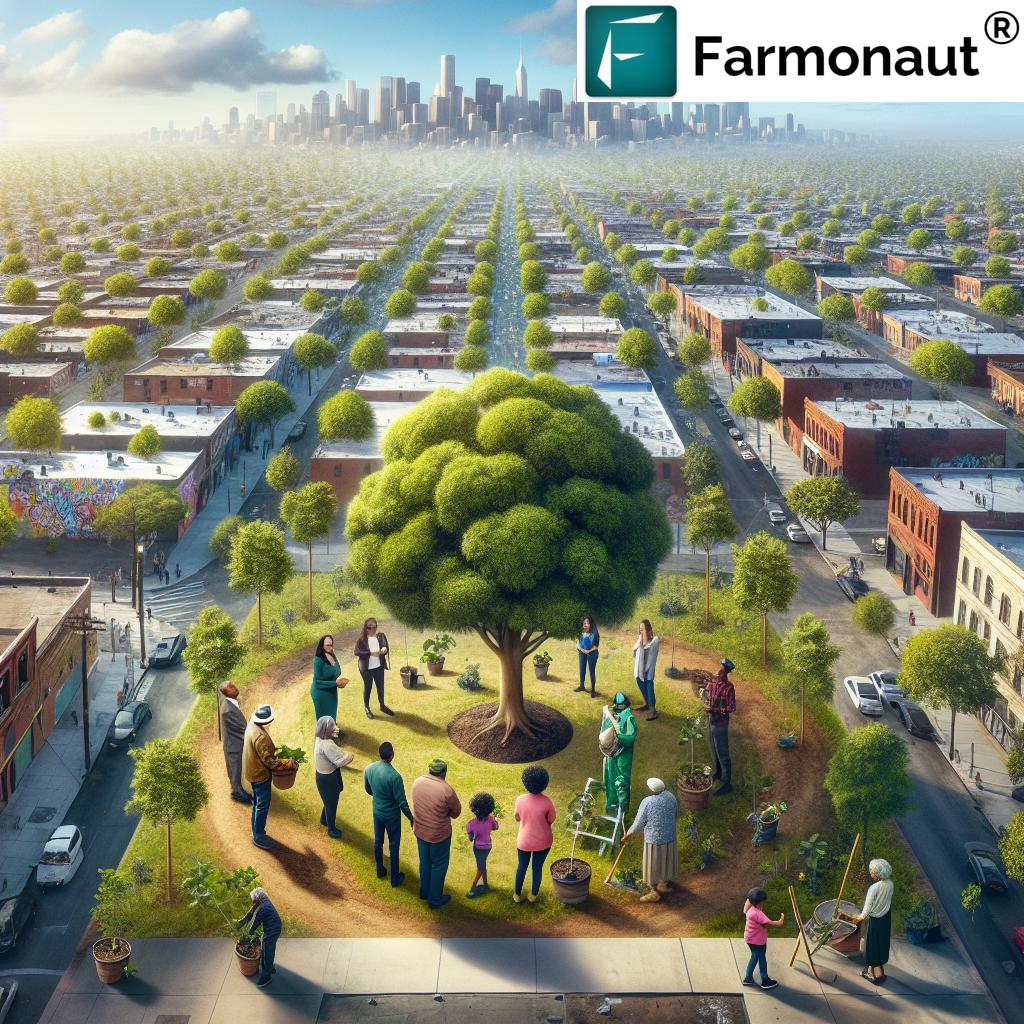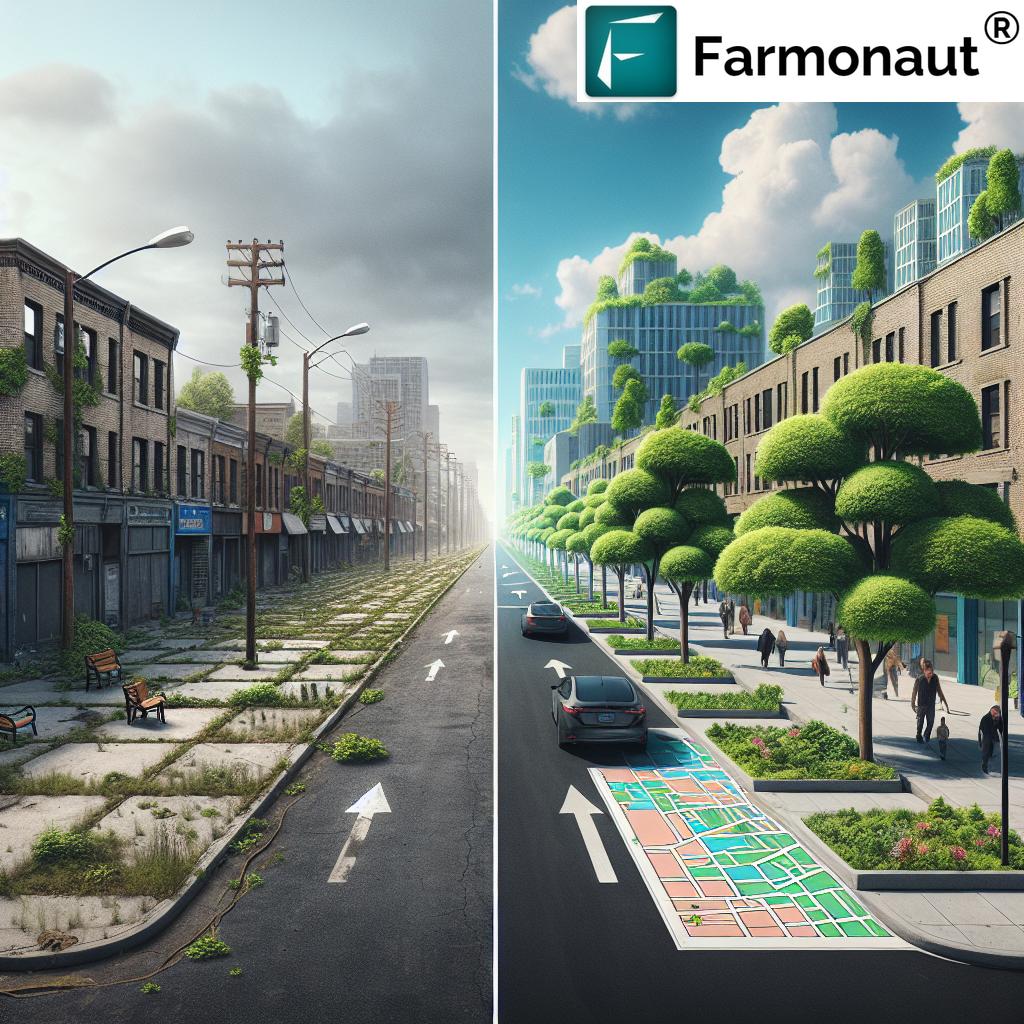Transforming Detroit: Epic Tree Equity Program Plants 25,000th Tree, Revitalizing Urban Neighborhoods

In a monumental stride towards urban forestry and environmental justice, Detroit’s ambitious Tree Equity Program has reached a significant milestone, planting its 25,000th tree in the McDougall-Hunt neighborhood. This achievement marks a pivotal moment in the city’s ongoing efforts to revitalize urban spaces, improve air quality, and address longstanding inequities in green infrastructure.
The Heart of Detroit’s Green Revolution
On a crisp Monday morning, October 28th, Bailey Park on Detroit’s east side buzzed with excitement as community members, city officials, and environmental advocates gathered to celebrate this remarkable feat. The event symbolized more than just the planting of a tree; it represented a growing movement towards environmental justice and sustainable urban development in Detroit.
Katrina Watkins, representing the Bailey Park Neighborhood Development Corporation, eloquently captured the essence of the initiative: “It’s about tree equity. Neighborhoods like McDougal-Hunt, we have a lack of trees. And there’s a lack of tree equity and park equity. And that’s the type of equity that we’re trying to create.“
The Detroit Tree Equity Program: A Model for Urban Transformation
Launched in 2022, the Detroit Tree Equity Program is a groundbreaking public-private partnership involving the city of Detroit, The Greening of Detroit (a local nonprofit), DTE Energy, and various other agencies. This collaborative effort aims to revolutionize urban forestry in Detroit, addressing historical disparities in tree distribution across the city’s neighborhoods.
- Goal: Plant over 75,000 trees
- Focus: Train residents in tree care and maintenance
- Investment: Raise and allocate millions for underserved areas
Lionel Bradford of The Greening of Detroit emphasized the program’s rapid impact: “Just two years in, the project has had enormous impact already.” This statement underscores the efficiency and effectiveness of the initiative in transforming Detroit’s urban landscape.
Community Engagement: The Root of Success
Community tree planting in Detroit has become more than just an environmental initiative; it’s a social movement bringing neighbors together and fostering a sense of ownership and pride in local green spaces. The program’s success lies in its grassroots approach, engaging residents in every step of the process, from planting to maintenance.

Senator Debbie Stabenow, chair of the U.S. Senate Agriculture, Nutrition, and Forestry Committee, highlighted the program’s multifaceted benefits: “We know this is more than just about trees and planting trees. It’s about people. It’s about communities and neighborhoods.” This sentiment reflects the program’s holistic approach to urban green spaces and community development.
Environmental Justice: Greening Underserved Areas
At its core, the Detroit Tree Equity Program addresses a crucial aspect of environmental justice in Detroit. Historically, lower-income neighborhoods and communities of color have had fewer trees, leading to higher temperatures, poorer air quality, and less access to nature’s benefits. By strategically planting trees in these areas, the program aims to correct this imbalance, creating a more equitable and healthy urban environment for all residents.
Want to track vegetation health in your area? Try the Farmonaut app:
The Impact of Urban Trees: Beyond Aesthetics
The benefits of increasing Detroit’s urban tree canopy extend far beyond beautification:
- Improved Air Quality: Trees act as natural air filters, reducing pollution and improving overall air quality.
- Temperature Regulation: Urban trees help mitigate the heat island effect, lowering temperatures in concrete-heavy areas.
- Stormwater Management: Trees absorb rainwater, reducing runoff and easing the burden on city drainage systems.
- Mental Health: Access to green spaces has been linked to improved mental health and reduced stress levels.
- Property Values: Neighborhoods with ample tree coverage often see increased property values.
Green Infrastructure: A Sustainable Approach to Urban Development
Green infrastructure in Detroit is becoming a cornerstone of the city’s revitalization efforts. The Tree Equity Program aligns perfectly with this approach, integrating natural solutions into urban planning. This strategy not only enhances the city’s resilience to climate change but also creates more livable, sustainable neighborhoods.
For developers interested in integrating green infrastructure data, check out our API and API Developer Docs.
From Tree Removal to Tree Planting: A Paradigm Shift
Detroit Mayor Mike Duggan highlighted a significant shift in the city’s approach to urban forestry: “Now, when I’m in the neighborhoods, they’re not saying, ‘Cut down trees.’ They’re saying, ‘Can we have those new trees that you guys are out there doing.’” This change in public sentiment reflects a growing appreciation for the value of trees in urban settings and the success of the Tree Equity Program in changing perceptions.
Looking Ahead: The Road to 75,000 Trees
As the Detroit Tree Equity Program celebrates this significant milestone, the focus now shifts to the ambitious goal of planting 75,000 trees. This objective represents more than just a number; it’s a commitment to transforming Detroit’s urban landscape, improving quality of life, and setting a new standard for sustainable urban development.
The success of this initiative could serve as a model for other cities facing similar challenges, demonstrating the power of community engagement, public-private partnerships, and strategic environmental planning in urban revitalization.
Get Involved: Be Part of Detroit’s Green Future
The Detroit Tree Equity Program offers numerous opportunities for residents and organizations to contribute to this transformative initiative. Whether through volunteering for tree planting events, participating in tree care workshops, or supporting the program financially, every contribution helps grow Detroit’s green canopy.
For those interested in learning more about the program or getting involved, visit the official Detroit Tree Equity Program website for information on upcoming events, volunteer opportunities, and ways to support this vital initiative.
Download our mobile apps to monitor green spaces in your area:
As Detroit continues to grow its urban forest, one tree at a time, the city is not just planting trees; it’s planting hope, equity, and a sustainable future for generations to come. The 25,000th tree planted in McDougall-Hunt is more than a milestone—it’s a testament to what can be achieved when communities come together to create positive change.


